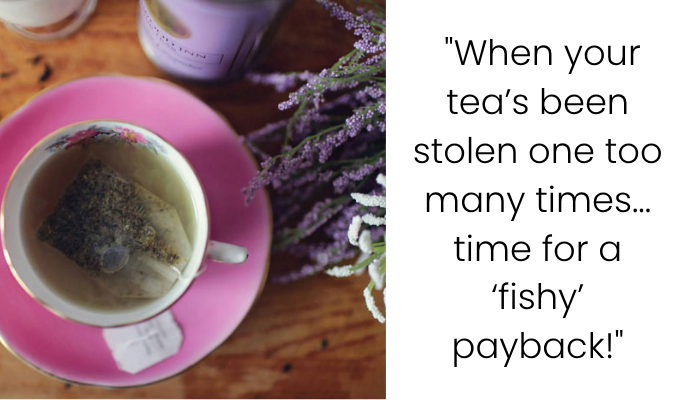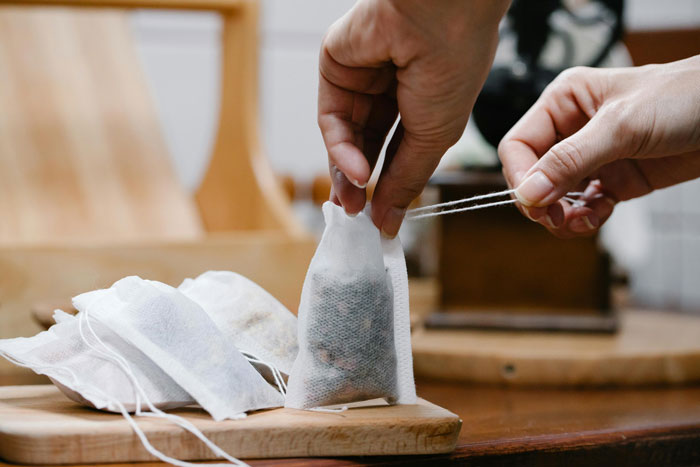AITA for Pranking My Tea Thief Coworker with Fish Sauce?

In this Reddit post, a 28-year-old woman (OP) shares her frustration about a coworker (Tina) who has been stealing her tea from a shared office kitchen. Despite labeling the tea box with a clear “do not take” note, someone kept taking large amounts of her imported tea. After repeated thefts, the OP decided to take matters into her own hands. She created a “booby trap” by soaking the tea bags’ tags in fish sauce, which made the tea smell and taste repulsive. When Tina, who was the apparent culprit, tried the tea, she reacted with disgust, and the OP revealed that it was hers. Now, Tina is upset and claims the OP set her up with a malicious prank. The OP wonders if she went too far or if Tina deserved the consequence.
Advertisement – Continue Reading Below
People who steal or eat other people’s lunches in the office are just asking for trouble because they clearly don’t respect the rules

The poster mentioned that her office has a ‘take one, leave one’ food policy, except for items that are labelled








This situation presents an interesting moral dilemma surrounding workplace boundaries, theft, and revenge. The OP’s decision to booby-trap her tea can be seen from two perspectives. On one hand, it could be argued that she was justified in taking action to protect her personal property after repeatedly asking people not to take her tea. The shared kitchen concept, while communal, also comes with an implicit respect for personal space and belongings, and Tina’s repeated disregard for the labeled box violates this trust.
However, others may see the OP’s response as excessive, particularly in a professional environment where pranks—even harmless ones—can lead to discomfort or conflict. The act of making the tea unpalatable, though non-harmful, could be seen as a form of retaliation that escalates the situation, especially since Tina likely didn’t intend to make the tea “gross.” Some might argue that the OP could have handled the situation more directly by speaking to Tina about her actions, or even involving HR if the theft continued, rather than resorting to a trick.
Advertisement – Continue Reading Below
From a legal and ethical standpoint, while no one was physically harmed, Tina’s potential embarrassment or discomfort could be seen as a consequence of the OP’s approach. If the workplace is an environment that values camaraderie and respect, pranks or tricks may lead to tension or discomfort, which can impact team dynamics. The OP’s action, though clever and satisfying for her, risks fostering animosity or escalating the issue further.

This situation also brings to light the dynamics of “communal” office spaces. Often, people assume that shared kitchens or snack areas are free for all to use, but it’s clear that there’s an unspoken line when it comes to personal items—especially when they’re labeled. The OP’s action underscores the frustration of feeling like personal boundaries are being violated repeatedly without accountability. This is a classic example of how small, seemingly inconsequential behaviors—like taking someone’s tea—can build up over time into a significant emotional response.
While some might see the OP’s actions as justified payback, others may view them as crossing a line in terms of professional conduct. Workplace environments can sometimes be a delicate balance of personal boundaries and group dynamics, and the response to Tina’s actions has introduced a layer of tension that may need to be addressed, either through a direct conversation or by involving HR to ensure such issues are managed respectfully in the future.
Advertisement – Continue Reading Below
Most folks sided with the poster and loved her idea to keep the tea stealer at bay







Ultimately, the OP’s response, though understandable in light of repeated theft, might have been a bit extreme. While Tina’s actions were disrespectful of personal property, the OP’s response might not have been the most constructive or professional. A more direct approach, such as having a private conversation with Tina or escalating the issue to HR earlier, might have resolved the situation without leading to discomfort or conflict. However, given that the OP felt pushed to take matters into her own hands, her actions also highlight the frustrations that arise from repeated boundary violations in shared spaces.
This situation is a reminder of the importance of clear communication, respect for personal space, and finding solutions that address issues without escalating tensions—especially in a professional setting.






